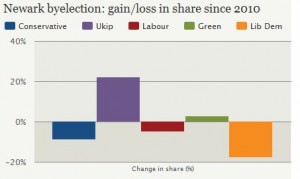The ongoing psyop to promote the Tories featuring the evisceration of UKIP’s Newark success
 The image accompanying this article is a representation of the results of last week’s Newark by-election. It shows five bars in a graph; three of them have grown below the line; two have grown above the line. The bar that is most prominent is the one that represents support for UKIP, and relative to all the other bars, it is the measure of that party’s success at last week’s Newark by-election.
The image accompanying this article is a representation of the results of last week’s Newark by-election. It shows five bars in a graph; three of them have grown below the line; two have grown above the line. The bar that is most prominent is the one that represents support for UKIP, and relative to all the other bars, it is the measure of that party’s success at last week’s Newark by-election.
When it came to the corporate-media’s interpretation of this data, however, there was a unanimous reaction across the so-called political spectrum; in one way, at least, this contrived interpretation chimed with the natural one, the data did indeed signify a failure for three parties, and great success for one. However, in an Orwellian shearing away from rational thinking, according to the corporate-media, it was the Tory Party who had been the most successful. Granted, that party had won the Newark by-election, but then they had been expected to win. But in terms of most (spectacularly) improved, they had not performed the best.
The corporate-media would also have its consumers believe that that there was one party amongst the other three failures who did worst of all. Perusal of the chart shows that their judgment in this matter was surprising; it was not the Lib Dems who were the most miserable failure, as the data seems to tell. No. In fact, that party would be UKIP. Indeed, in the days after Newark, the media, across the entire so-called spectrum, described UKIP as finished – a spent force. This was such a very strange response that even in the most disinterested it really must have caused the raising of an eyebrow or two (or else there is no hope for this country).
This author holds that the Establishment was conspiring amongst its parts to try to create a Tory government in 2015 (and that this has been going on for a while – thus it is continuing). Those readers who think this idea is a wild one should consider that the likes of Peter Hitchens have noticed that there has been, in this election season of May and June, a tendency for all corporate-media, whichever side of the political spectrum, to lionise the Tories: “London media spent the first half of the week claiming that Ed Miliband was the one in trouble”. He blamed the collaboration on a desire to present a unified promotion of Blairism, with Cameron representing its latest incarnation – and its hope into the future. Assumedly, in this scheme of things, the controlling hub of the operation would be Conservative Central Office.
In my opinion, the conspiracy was coordinated from a place in Government well above party dividing lines; a place that has historically been commissioned to use information to manipulate audiences both domestic and foreign for the benefit of the survival of the real British Government – by which is not meant the people in parliament, but the institutions (the corporate body of the monarchy), and financier funders and string-pullers. Getting to the crux, therefore, we are talking about an operation conducted by British intelligence agencies. This is difficult to prove, of course, but there have been revelations in the past that give outsiders an idea as to how this happens (David Shayler, for instance). Also recently very revealing has been the individual activities of some journalists, both American and British, with regards to NATO activity in Libya and Syria, underneath a broad corporate-media unity of propaganda that was exposed as such and countered by alternative media sources. This recent experience has suggested a too close connection between Anglo-American journalism and the realisation of real military tactical objectives. Besides which, the journalist in circumstances of war as a propagandist for his government is something that is not entirely unknown in history. The possibility that certain journalists are connected with intelligence agencies should not seem implausible.
Critics might say “that may be so, but there is no war between UKIP and the Establishment that the latter should bring all its intelligence assets to bear against UKIP”. Unfortunately, this is not correct. There is a war going on in the UK; there is an information war for the power to influence the population and through it decide our collective destiny. In Civil War terms (which is what we are perhaps in a long phony stage of) the Country wants sovereignty, as is its right, the Court (or Establishment) wants to collaborate with off-shore powers to deny the Country. In this information war, we should expect attempts at psychological manipulation of the like that we see when the government is trying to create consensus for real physical war, or to convince a population at war to accept the associated deprivations.
The ongoing promotion of the Tory Party, and the rubbishing of UKIP, is such a psychological operation being executed by the Establishment in the information war that is currently raging. The Newark component of this psyop was potentially devastating because it could have seen the May/June election season terminate with the impression being given to the electorate that UKIP had failed (even though they had not). I suspect that the Tories knew very well that Newark, being too safe a seat, would not be lost. Meanwhile, the level of UKIP’s insurgency meant that no other party could sneak in to win. The enormous activity in the area by Tory High Command was not so much to ensure the win, but to ensure a respectable gap. This too was psychological, because it made it look as if the Tories were worried about UKIP – like they believed UKIP could win (UKIP’s losing would therefore have all the more significance). All the big Cabinet names that visited made it look as though the Tories were vulnerable. The truth was, UKIP was going to get judo-thrown by its own EU election success. To nail the psyop, all the Tories would need was blanket corporate-media co-operation after the event to sell the idea that UKIP had been counter-attacked and not only lost the encounter, but had lost the war.
The very first in the sequence of events that brought about the opportunity for such a psyop was very suspicious; it was the timing of the resignation as an MP or Patrick Mercer (Wikipedia coverage here). On the 29th April he announced that as he had done something wrong, then honour dictated he should go. However, it should be noted that he had previously decided that it was ok to sit as an independent MP for nearly a year since his questions for cash scandal blew up. This exercised the likes of Zac Goldsmith who were wondering why Cameron’s promised mechanism of recall wasn’t in place to remove Mercer. “If it’s bad enough for you to resign from your party, how can it be ok to continue representing constituents at all?” asked Goldsmith. This point is crucial. My answer to the question would be that the Mercer problem offered an opportunity, and it needed to be put on the shelf until the resultant by-election could be used most effectively by the Tories.
The excuse for Mercer to finally leave his office was news that the Committee on Standards would recommend he be suspended from the House of Commons for six months. The way this news arrived was also suspicious in itself. It was due on 30th April, but it was leaked on the 29th – apparently prompting Mercer to act a day earlier than he might have otherwise. This timing might have had everything to do with the fact that the Moving of Writs (the initial event in the process of calling a by-election) tend to happen on a Thursday. I gather that this is not set in stone, but the process for other recent by-elections has commenced on that particular day of the week also (Eastliegh [Thursday 7th Feb 2013], and Croydon, Middlesbrough and Rotherham [Thursday 8th November 2012]). In this case, the writ was moved on 1st May. If parliament is anything like the courts where certain business seems to get done on certain days, arguably, the early resignation avoided a week’s delay. I suspect that this doesn’t sound like much to be worried about by the man on the street, but to generals conducting a war, timing is everything.
There does not seem to be an official time limit for the moving of the writ after a Westminster seat has become vacant. The Parliament website says that it can take up to 3 months; 6 months has been known, and if a general election is close, the seat can even remain vacant. When the writ is moved, however, there is model timetable under the Electoral Registration and Administration Act 2013, and the Newark by-election seemed to follow this. Essentially, the Moving of the Writ defined the polling day.
Notice, Mercer’s eventual punishment, had he had remained, would have been suspension and not permanent banishment; resignation sometimes pre-empts the heave-ho, but not in this case. Having already announced he was stepping down for the 2015 election, Mercer took a hint that some people didn’t want him even until then. Arguably, therefore, Mercer did not need to step down, but got a nod to do so; even then, his seat may have remained vacant for a longer period; but instead events coincided so that a by-election could be held in the week after the results of the EU elections has been announced. This was very sensitive timing indeed.
The next event of interest was an interview by the BBC of Nigel Farage on the evening of 29th April during a public meeting in Bath. There are lots of these meetings where there is no corporate-media in attendance, but this time the BBC was in town apparently, if a day-time interview now posted on YouTube is anything to go by, to gauge his reaction to something said about Lenny Henry (so presenting Farage with more dodgy evidence of the UKIP’s racism – which had become usual fare). In another later interview, which seems to be from the site of the UKIP meeting, Farage was asked about the news of the upcoming Newark by-election triggered by Mercer’s resignation. Farage revealed that he hadn’t given it proper consideration. In a question, the journalist asked if Farage was “seriously tempted” to stand in the election, Farage replied “oh yes I’m tempted”.
The next day, in the Daily Mail for instance, this became
“Ukip leader Nigel Farage said last night he would ‘seriously’ consider standing himself”.
and
“David Cameron faces the prospect of a nightmare by-election showdown with Nigel Farage after shamed Tory MP Patrick Mercer quit last night.
“His decision will spark a Tory showdown with Ukip this summer in what is normally a safe Conservative seat in Newark, Nottinghamshire.”
Notice; although the Conservative seat is usually safe, it offers a nightmare by-election showdown for Cameron. The Mail’s reporting is all in doublethink – unless the idea was to present the notion that only Farage himself of any UKIP candidate was capable of winning. Only this circumstance would prove the nightmare for Cameron.
That the seat came to be considered bait for Farage is perhaps suggested more by the reaction of corporate-media and LibLabCon politicians when Farage let it be known that he would not stand. To say that these critics were disappointed is an understatement. The corporate-media was full of name-calling; Farage was a “bottler”. This was obviously a talking point – a centrally scripted meme regarding a topic illustrating how Establishment propaganda outlets must deal with an issue. When Farage took the trouble to deny “bottling” the fight in Newark, in the passive aggressive way of the modern politician, David Cameron made a disparaging reference to him during a flimsy radio interview; he had been holding forth on the subject of being pelted with eggs (this is what passes for politics in popular culture). This was translated in the Telegraph as a taunt. “David Cameron: Nigel Farage is a chicken”.
What this individual reaction probably denotes most of all is frustration from someone who was clear about the potential of certain events culminating in certain ways and not others; Farage was not going to be set up for the fall that had been intended for him. Although the corporate-media, and LibLabCon politicians could still make a certain amount of hay, Farage would not offer the opportunity to be pilloried as a loser.
It must be said, because hindsight is all very well, that this author certainly felt at the time that there had been an effort to entice UKIP to abandon its pre-laid battle plans; Farage had been going to direct the EU elections, not peel off to focus on Newark. Again, this was the Establishment using principles of warfare: the highest form of generalship is to balk the enemy’s plans. In this case, Sun Tzu was also talking about manoeuvring ones enemy into a position conducive for counter attack. Of course, all this fighting would be done psychologically.
In actual fact, the Tories did achieve the objective of putting UKIP into a position where they could be counter-attacked after the EU elections – UKIP had no control over this. Unfortunately, the psyop ultimately failed because of Farage’s decision not to fight the seat. In addition, lately Roger Helmer has been rewarded by the twenty three other UKIP MEPs with the leadership of their delegation in the EU Parliament; this isn’t what happens to a man who is considered to be a loser. The UKIP conference that came on the heels of the elections was attended by people who didn’t feel as if they had lost anything. The best news of all is that people with vision in UKIP are seeing possibilities as suggested to them by the elections – nothing short of a UKIP strategy for victory in 2015. The Establishment Newark psyop has certainly not dented UKIP resolve or optimism.
At the closure of this lengthy article, it’s very briefly worth remembering that psychological operations are something that the British Government organises in places like Iraq, Libya and Syria to aid in the overthrow of sovereign governments, and to keep the occupied population suppressed. That the British people find themselves subject to the same treatment tells us something very important: the British Government sees the British people as an enemy to be dominated. In terms of applying this dominance in the context of the so-called civilised Home Counties, it is all about making sure that people are deceived into thinking that they are free to choose, and have good options to choose from; if the reader cannot get his or her head around psyops, at least this much must ring true. Having said that, that reader should really take it upon him or herself to understand, sooner rather than later, the real truth is that the LibLabCon British Establishment surely is the worst enemy of the British people that exists today on the planet, or indeed ever did exist.


















